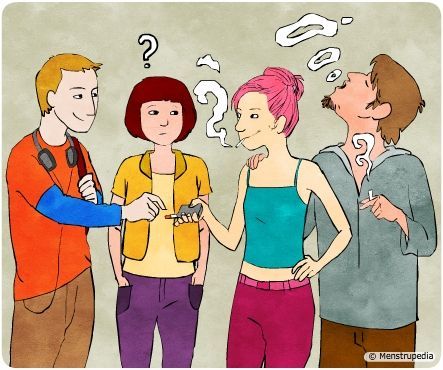Puberty And Peer Pressure
Jul 18, 2019 • 144 views

Teenage- a phase where our body steps into adulthood and our mind is still somewhere in our childhood days. Numerous changes take place internally and externally amongst children of this age group. Boys and girls are maturing at rapid paces but their emotional maturation is a lot slower.
The period of adolescence is also called puberty. This generally takes place during the age of 12-18. Hence it is also called ‘Teenage’. Puberty is the process of physical changes through which a child's body matures into an adult body capable of sexual reproduction. Girls and boys go through physical changes. We all have learned these bookish definitions in our school days. But what we don’t pay attention to is the psychological changes that take place in a teenager. As children become teenagers their friends seem to have more influence on them than the parents do.This is where peer pressure comes into play.
Peer pressure (or social pressure) is the direct influence on people by peers, or the effect on an individual who gets encouraged to follow their peers by changing their attitudes, values or behaviors to conform to those of the influencing group or individual. This can result in either a positive or negative effect.
Types of Peer Pressure
1.Spoken Peer Pressure:
Here, we see peers verbally influencing a teenager to behave the way they are behaving. Let’s take an example: A peer might be seen saying to a teen, “Let’s smoke. It’s a fun thing to do.”
2.Unspoken Peer Pressure:
Here we see teenagers getting influenced by their peers without any provoking verbal communication taking place between them. For example, a teen may start substance abuse or smoking if he sees all his friends doing it fearlessly.
3.Negative Peer Pressure:
Teens have been known to have chosen the wrong path of life due to peer pressure by taking to substance abuse, excessive drinking and smoking, thieving and shoplifting, etc.
4.Positive Peer Pressure:
Peer pressure is not always negative. Sometimes, it inculcates new hobbies, sporting spirit, health conscience or a tireless determination to succeed in life amongst teenagers.
5.Adult Peer Pressure:
It has been observed amongst working professionals. For example, an employee may turn corrupt after they have seen their seniors at work accept a bribe.
Analyzing Peer Pressure
Positive Side:
Usually, peer pressure is used in a negative context. But there is always another side of the coin. Positive peer pressure can help you adopt good habits. If you are smart enough to pick the right habits of your peers, it will leave a positive impact on your life.

Negative Side:
We are well aware of the negative side of peer pressure. There might be a particular idea, a habit, or a lifestyle which you personally dislike and would not like to accept. However, your peer group would want to compel you to do something which is against your own will. As a result, when you take a wrong decision by succumbing to peer pressure, you may land yourself in deep sorrow and feel remorseful about the whole situation. Similarly, a large number of vices such as smoking, drinking, becoming drug addict etc., are cultivated when teenagers blindly follow their peers, putting aside their own will. The worst part is that you lose your identity and lifestyle.

How Can Parents Help Manage Teen Peer Pressure?
One of the biggest concerns and fears of parents is how their child will react to peer pressure when the children become teenagers. So, how to deal with peer pressure? The key is good parenting.
1.Asking about a teen’s day:
Having a conversation with them every day to keeps parents updated about the events in the teenager’s life. It allows the teen to know that their parents are open to communication, and he/she can rely on them for emotional support. Also, parents should maintain a calm approach.
2.Building Self-Confidence:
Teens with poor confidence levels and low self-opinion are more likely to succumb to negative peer pressure. Parents should build teens’ self-confidence.
3.Setting Some Rules:
Parents should have some rules for the children to follow. This will make the teen know what is acceptable and what is not.
Conclusion
It can be concluded that teenage or puberty is a very sensitive phase of life where each one of has to go through. Studies show that it is the time when our brain has the greatest capacities to learn anything. Now, it depends on the individual how they utilize their brain. So, proper awareness is very crucial at an early age so that adolescents can resist negative peer pressure. Here are few things that the teens can do:
1.Spend time with those who resist peer pressure.
They’re the ones who stand up for themselves even in the face of bullying. These are the people one should want in their corner. Also, choose friends carefully.
2.Learn how to be assertive.
Learn to say "No" in a way that's calm and convincing.
3.Get out of the situation.
When a situation begins to turn bad—such as a group of people doing risky things—bow out of the situation as soon as you can.
4.Provide your own positive pressure.
Rather than simply fighting against negative pressure, focus on providing a positive alternative.
5.Go with your gut.
If something doesn't feel right for you, then it's not.
One should keep in mind that everyone makes mistakes; stupid people keep making the same mistakes. So we should learn from our mistakes. If we are aware enough and have the guts to resist to negative influence, then puberty is a beautiful phase of life and we can achieve great heights.
